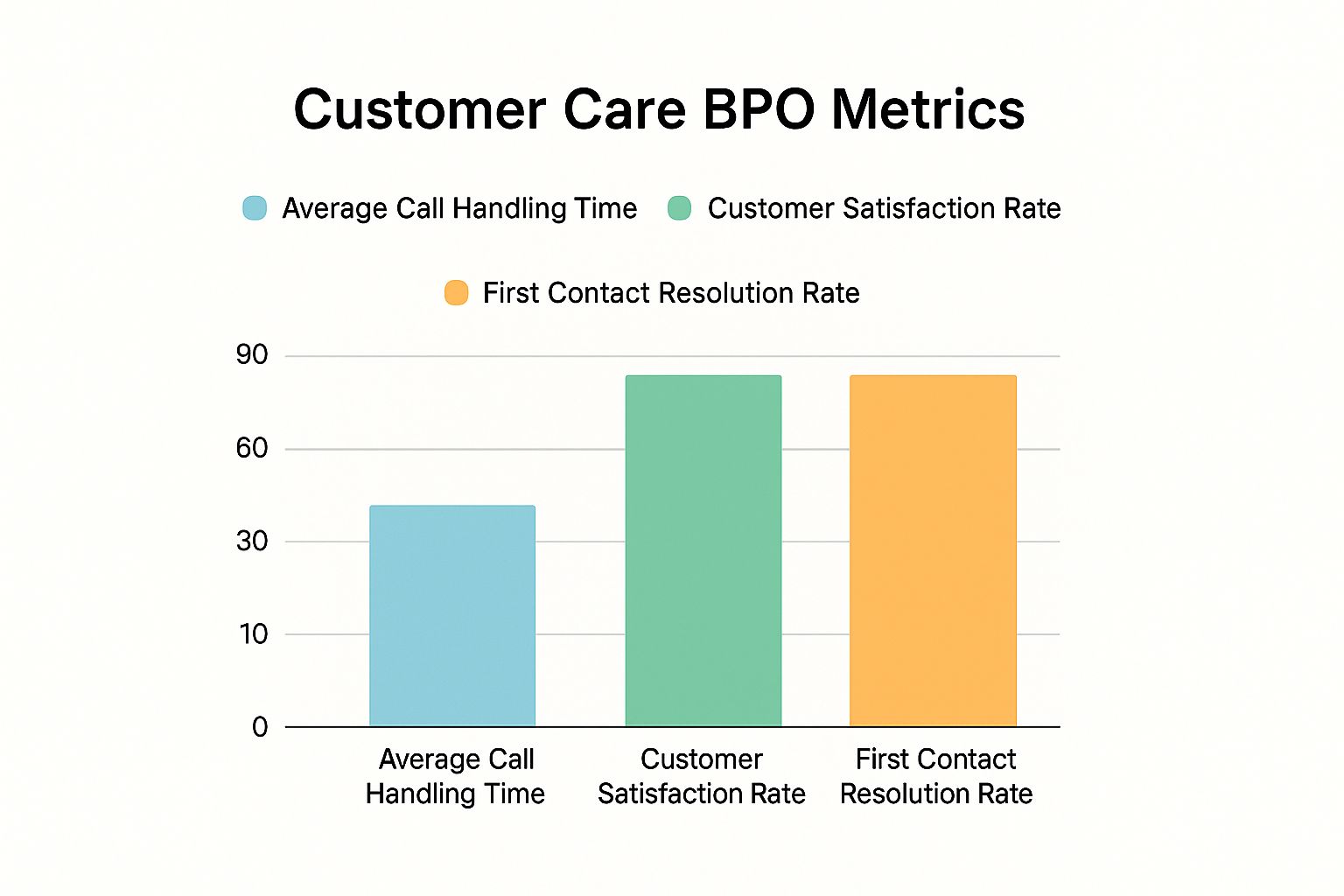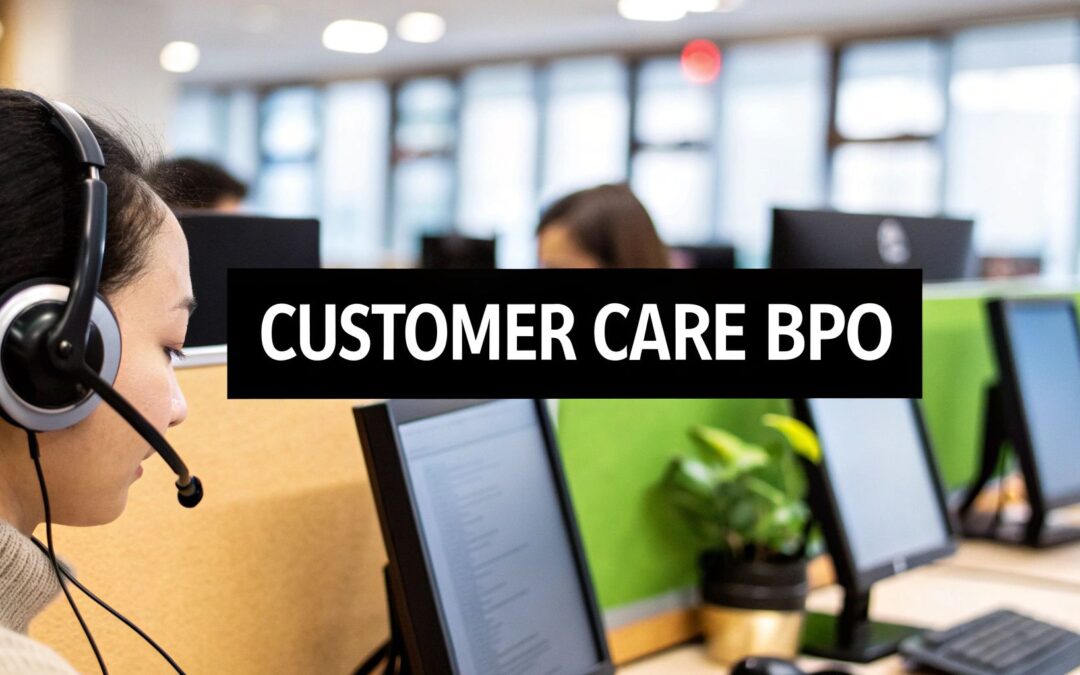Think of customer care BPO (Business Process Outsourcing) as bringing in a specialized team to handle all your customer interactions. Instead of your in-house staff juggling everything, you hand over the reins for phone calls, emails, and live chat to a dedicated provider.
This frees up your core team to focus on what they do best—growing the business—while ensuring your customers get professional, top-notch support every time.
What's Really at the Heart of Customer Care BPO?
At its core, customer care BPO is a strategic partnership. You’re not just offloading tasks; you're entrusting a critical part of your business to experts who have the right people, technology, and processes to do it better and more efficiently than you could on your own.
This move allows companies to tap into a global talent pool and sophisticated operational models without the massive upfront cost of building it all from scratch.
To give you a clearer picture, here's a quick rundown of what customer care BPO really means in practice.
Customer Care BPO At a Glance
| Core Concept | Primary Goal | Key Services | Main Benefit |
|---|---|---|---|
| Strategic Partnership | Enhance customer satisfaction and operational efficiency. | Inbound calls, outbound engagement, live chat, email support. | Access to specialized expertise and technology. |
This table shows how BPO isn't just one thing; it's a comprehensive approach to managing the entire customer journey, from first contact to long-term loyalty.
A Look at Common BPO Services
A good BPO partner covers a wide range of functions designed to manage the entire customer lifecycle. This usually includes:
- Inbound Support: The classic help desk. This involves answering incoming customer calls, troubleshooting technical problems, and helping people place orders.
- Outbound Engagement: Proactive communication. Think follow-up calls to check on customer satisfaction, qualifying new sales leads, or setting appointments for your sales team.
- Digital Channel Management: Meeting customers where they are. This means providing real-time support through live chat on your website, managing email inboxes, and responding to comments on social media.
The real game-changer for many businesses is the ability to offer 24/7 support. By outsourcing, companies can serve a global customer base or simply provide around-the-clock help, making sure no customer is left waiting, regardless of their time zone.
A Market That's Growing Fast
It’s no surprise that demand for these services is skyrocketing. The global customer experience BPO market was valued at a massive USD 102.03 billion and is on track to hit USD 296.29 billion by 2033.
This incredible growth shows just how vital outsourcing has become for businesses that want to scale smartly and keep their customers happy.
Of course, the "how" is just as important as the "who." As technology evolves, it's worth exploring the differences between older models and newer solutions. Comparing AI Voice Agents versus traditional call centers can give you a better sense of how technology is shaping the future of customer support. Ultimately, the goal is to find a partner that acts as a seamless extension of your brand.
The Real Benefits of Outsourcing Customer Care

It’s one thing to know what a customer care BPO does, but the real lightbulb moment happens when you grasp why it's such a game-changer. This isn't just about shuffling tasks off your plate; it's a strategic move that can fundamentally change how your business operates and grows.
When you partner with a BPO, you're not just offloading work. You're plugging into a system built for efficiency and gaining a serious competitive advantage.
Transform Your Cost Structure
Let's talk money first, because it's often the most dramatic benefit. A customer care BPO takes all the messy, unpredictable fixed costs of an in-house team and turns them into a single, manageable variable expense.
Think about it. An in-house team means salaries, benefits, office space, recruitment headaches, and pricey software licenses. Outsourcing wraps all of that into a predictable cost that moves with your needs. This financial shift is a lifeline for scaling companies.
Instead of being locked into long-term hires and infrastructure, you simply pay for the support you use. This can unlock huge savings, freeing up cash to pour back into what you do best—like building a better product or finding new customers.
The demand for this kind of efficiency is undeniable. The business process outsourcing market in the United States alone was valued at USD 70.66 billion and is on a steady growth track. This isn't just a niche trend; it's a major industry shift. You can explore the full BPO market analysis to see just how widespread this is.
This financial agility naturally leads to the next big win: scaling without the growing pains.
Scale Effortlessly with Demand
Picture this: you run a booming e-commerce store. Things are humming along nicely, but then the holiday season hits, and your sales go through the roof. Trying to handle that surge internally is pure chaos. You're scrambling to hire temporary staff, rush through training, and then deal with layoffs come January.
A customer care BPO makes that entire nightmare disappear.
With a good partner, you can add or remove support agents almost overnight. This flexibility means you can:
- Handle Seasonal Peaks: Need to triple your team for Black Friday? No problem.
- Support Product Launches: Roll out a new product and instantly have a team ready to field all the questions.
- Adapt to Market Changes: Adjust your support capacity on the fly without disrupting your core business.
This on-demand model means you never leave a customer hanging. It turns a potential point of failure into a seamless, positive experience for your buyers.
By outsourcing, you’re essentially renting a world-class customer service department. You get immediate access to seasoned professionals, proven workflows, and advanced technology without having to build any of it yourself.
Access Instant Expertise and Technology
Let's be honest, building a top-tier customer service team from scratch is a massive undertaking. It can take years to develop solid training programs, set up quality control, and invest in the right contact center tech.
A BPO partner has already done all that hard work. They live and breathe customer interactions.
Their agents are trained pros who know how to de-escalate tricky situations, and their operations are built on technology that might be out of reach for your budget. You get all the benefits of a mature, high-performing support operation from day one, skipping the expensive and time-consuming learning curve.
Comparing Onshore, Nearshore, and Offshore BPO Models
So, you’ve decided to outsource your customer care—that’s a huge first step. Now comes the real question: where should your new team be located? This isn't just a geographical choice; it's a strategic decision that directly impacts your budget, your company culture, and how you communicate with both your team and your customers.
Let's break down the three main delivery models: onshore, nearshore, and offshore. Each one comes with its own unique blend of pros and cons, and the right fit depends entirely on your business priorities.
The Onshore Advantage: Keeping it Local
Think of onshore outsourcing as hiring a team in your own backyard. If you're a U.S.-based company, your onshore partner would also be in the United States. The big win here is seamless cultural and linguistic alignment. Your customers won't even know they're talking to a partner team, which is a massive plus for building brand trust.
Of course, that perfect alignment comes at a premium. Onshore is the most expensive option, and that high cost is often what pushes businesses to explore other models.
Nearshore: The Best of Both Worlds?
This is where things get interesting. A nearshore model offers a fantastic middle ground. For a U.S. business, this means partnering with a team in a nearby country, like Mexico or Costa Rica. You get significant cost savings compared to staying onshore, but you still benefit from similar time zones.
This time zone alignment is a game-changer for collaboration. No more 3 AM calls to sync up with your team. While there can be slight cultural differences, they're typically minor and much easier to bridge than with a team on the other side of the globe.
Offshore: Maximum Savings, Global Reach
For businesses focused on maximizing their budget and scaling rapidly, the offshore model is incredibly compelling. This involves partnering with a BPO in a country like the Philippines or India, where labor costs are much lower. These savings can allow a company to offer 24/7 support or expand its team in ways that would be financially impossible at home.
The trade-off? You have to be prepared to manage big challenges. We're talking significant time-zone differences and potential cultural and communication gaps that demand a very deliberate and well-structured management approach.
The key takeaway is there's no single "best" model. It's all about what's best for you. A company with a sensitive, local customer base might find the cultural fluency of an onshore team non-negotiable. On the other hand, a global brand needing round-the-clock coverage might see an offshore partner as essential for growth.
To make this even clearer, here's a simple breakdown of how these three models stack up against each other based on what most businesses care about.
Onshore vs Nearshore vs Offshore BPO Models
| Model | Cost Level | Time Zone Alignment | Cultural Proximity | Best For |
|---|---|---|---|---|
| Onshore | High | Excellent | High | Companies needing seamless cultural alignment and serving a domestic customer base. |
| Nearshore | Medium | Good | Medium | Businesses looking for a balance of cost savings and easy collaboration. |
| Offshore | Low | Low | Low | Organizations prioritizing cost reduction, scalability, and 24/7 coverage. |
Ultimately, this table helps visualize the trade-offs. You're balancing cost against convenience, cultural nuance, and operational complexity.

As the data shows, each model excels in different areas. The right partner isn't just about location; it's about finding the one whose strengths perfectly align with your business goals, whether that's unmatched customer satisfaction or incredible operational efficiency.
Key Services Your BPO Partner Can Provide

Never mistake a customer care BPO for just another call center. Picture it as a hub where emails, chats, social posts and calls all converge under one roof.
In this setting, your brand reputation is guarded, and customer ties are strengthened one interaction at a time. These partners cover everything from on-the-spot problem solving to outreach before an issue even pops up.
Inbound Support Services
Inbound support is your first line of defense—always ready when customers reach out.
- Technical Helpdesk: Agents coach users through software hiccups, walk them through features, and escalate tricky bugs to your development team.
- Order Processing: E-commerce brands can hand off the entire cycle—taking orders by phone, handling returns, and giving shipping updates.
- Customer Service Inquiries: Whether it’s billing questions, product details, or general troubleshooting, every interaction ends on a helpful note.
These reactive services form the backbone of reliability. Yet, to stand out, you also need to reach beyond waiting for calls.
Outbound Engagement
Outbound efforts flip the script: your team initiates the conversation.
- Gathering feedback through post-purchase surveys
- Qualifying leads before they hit your sales funnel
- Checking in on product usage to spot upsell opportunities
A well-crafted outbound campaign doesn’t just dial numbers—it uncovers insights that can steer product updates and refine your marketing playbook.
Digital Channel Management
Support now lives wherever your customers spend time. That means juggling real-time live chat, swift email responses, and proactive social media monitoring.
They watch for brand mentions, reply to comments, and step in before a minor gripe turns into a public complaint. The global call center market hit USD 340 billion and is expected to climb to USD 496 billion as more brands chase coverage across channels.
Explore more about the growth of the call center industry to see the full scope. By exploring the full range of outsourced BPO services available, you can build a truly comprehensive support system.
How to Choose the Right BPO Partner
https://www.youtube.com/embed/AKLuQaPWcdg
Picking a customer care BPO partner is a massive decision for your brand. This isn't just about finding the cheapest hourly rate; you’re handing over your customer relationships to another team, trusting them to represent you with skill and care.
Get it right, and you can supercharge your growth. But get it wrong, and the damage to your reputation can be tough to undo.
Think of it less like hiring a vendor and more like bringing on a senior leader for a critical department. You have to dig deep—vet their experience, check their track record, and make absolutely sure their values are a match for yours. A great BPO feels like a genuine extension of your own team, not just a line item on a contract.
Evaluate Industry-Specific Expertise
Your first filter should always be industry experience. It’s a non-negotiable. A BPO that’s fantastic at handling returns for e-commerce brands probably isn’t equipped to troubleshoot complex technical issues for a SaaS company.
You need a partner who already speaks your industry's language and understands its unique challenges and customer expectations. For example, if you're in healthcare, any potential partner must have a rock-solid history with HIPAA compliance. In financial services, they need to live and breathe security protocols like PCI DSS.
Don't be shy about asking for proof. Request case studies and references from companies that look a lot like yours. Seeing their past success in your specific niche is one of the strongest signals that they can deliver what you need.
Scrutinize Their Technology Stack
The technology a BPO uses is the engine that drives everything. A partner running on outdated, clunky systems will never be able to deliver the fast, seamless, multi-channel support that customers now demand. You need to get under the hood and look at their tech.
Here are a few critical questions to ask:
- Do they use AI-powered analytics? This is key for spotting trends, tracking agent performance, and ultimately improving customer outcomes.
- What CRM or contact center platform are they on? You need to know if it will play nicely and integrate with your existing systems.
- How do they approach security and data privacy? Look for concrete proof, like ISO 27001 or SOC 2 compliance certifications.
As you look into a BPO's tech, it helps to know what modern platforms are capable of. This complete guide to Zendesk Support Suite AI features and alternatives is a good resource for understanding the kind of tools a top-tier partner might use.
Focus on Cultural Fit and Training
At the end of the day, the BPO's agents become the voice of your brand. A disconnect in culture or communication style can feel jarring and off-putting to your customers. Your ideal partner should feel like a natural part of your company.
The most successful BPO relationships are built on shared goals and mutual respect. Look for a partner who is genuinely invested in your success, not just in fulfilling the terms of a contract.
Take a close look at their agent training and quality assurance programs. How do they get new hires up to speed? What systems are in place to maintain a consistent brand voice? A thorough, well-designed training program shows they take their role as your brand ambassador seriously.
A focus on https://ziloservices.com/blogs/data-driven-decision-making/ within their quality process is another great sign of a mature, effective partner. By concentrating on these three core areas—expertise, technology, and culture—you'll be in a great position to find a customer care BPO that helps your business truly thrive.
Forging a Strong and Lasting BPO Partnership

Think of signing a BPO contract as the starting line, not the finish. The real magic of outsourcing doesn't happen overnight. It’s built over time through a genuine, collaborative partnership. Getting this right is what separates a basic vendor from a true strategic ally that actively helps you grow.
The key is to move past a simple transactional relationship. You want your BPO team to feel like a seamless extension of your own company, fully invested in your mission. To get there, you need a solid game plan for communication, performance tracking, and brand alignment from day one.
Establish Crystal Clear KPIs
You can't hit a target you can't see. Before a single customer call is answered, you and your partner need to agree on what success actually looks like. That means setting clear Key Performance Indicators (KPIs) that directly support your business goals. Vague objectives just lead to frustration and mediocre results.
Make sure your KPIs are specific, measurable, and tracked religiously. Some of the most critical metrics include:
- First Contact Resolution (FCR): What percentage of customer issues are solved on the very first try? A high FCR is a fantastic sign of an efficient and knowledgeable team.
- Customer Satisfaction (CSAT): This is the classic "how did we do?" survey. It's your most direct pulse on how happy customers are with the support they just received.
- Average Handle Time (AHT): While speed is good, it can't come at the expense of quality. This metric needs to be balanced with FCR and CSAT to ensure you’re not just rushing customers off the phone.
These numbers create a shared scorecard, keeping both you and your BPO partner focused on the same prize.
The best BPO relationships feel like one big team. When you treat your outsourced agents with the same respect and inclusion as your in-house staff, they become your most passionate brand champions.
Create Robust Communication and Training
A great partnership runs on open, constant communication. Don't just wait for a quarterly business review to find out how things are going. Set up a regular rhythm of check-ins, whether it's quick daily huddles or more in-depth weekly performance reviews. Shared, real-time dashboards are also a must-have for keeping everyone on the same page.
Just as crucial is deep, immersive training. Your BPO agents are the voice of your brand, so they need to live and breathe your company's values, tone, and culture. Go way beyond just teaching them the product manual. Immerse them in your brand story and the promises you make to your customers. Many of these training and onboarding steps can be improved, as we cover in our guide to business process automation.
When your BPO team genuinely feels connected to your mission, the result is more authentic, empathetic, and effective customer care.
Common Questions About Customer Care BPO
Even when you see the clear benefits, taking the leap into a customer care BPO partnership can feel a little daunting. That’s perfectly normal. Let's tackle some of the most common questions that come up so you can move forward with confidence.
A big one we hear all the time is the fear of losing control. Will outsourcing mean giving up your brand's voice and the quality of your customer experience? The short answer is no. A good BPO relationship is a true partnership. You’re not just handing over the keys; you're setting the roadmap through detailed Service Level Agreements (SLAs) and leading all the brand training. Your provider becomes a guardian of your brand, and they prove it with transparent reporting that shows they're hitting the high standards you've set.
Is BPO Only for Large Corporations?
Not in the slightest. In fact, it’s often the small and medium-sized businesses that get the most out of it. Think about it: BPO gives you immediate access to top-notch technology and a team of skilled agents without the crippling upfront cost.
The models are flexible and built to scale, so you only pay for the support you actually use. This kind of setup lets smaller companies offer the kind of professional, 24/7 support that was once only possible for their giant competitors, effectively leveling the playing field.
How Do BPOs Handle Sensitive Data?
This is a critical question, and the answer is simple: with extreme care. Any reputable BPO provider’s entire business is built on a foundation of trust and security. They live and breathe international compliance standards.
When you're vetting a partner, look for key certifications like ISO 27001 and don't be shy about digging into their security protocols. You should see things like end-to-end encrypted communications, secure facilities with strict access controls, and ongoing privacy training for their entire staff. It's all about protecting your customers' sensitive information.
Ready to scale your operations with skilled, reliable talent? Zilo AI connects you with top-tier professionals and provides the high-quality data services you need to drive growth. Empower your business with Zilo Services to learn more.

